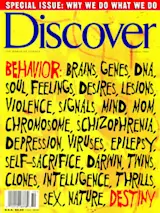Biological explanations of violence are much in vogue. Part of the reason is that scientists studying the seat of behavior, the brain, and its genetic underpinnings, have learned a lot in recent years. Tendencies toward violence, they tell us, may reside in our genes or be hard-wired into our brains. Some neuroscientists have mapped brain abnormalities in laboratory animals and human murderers that seem to correlate with aggressive behavior. Others have teased out apparent connections between violent behavior and brain chemistry.
Being scientists, these researchers often try to tone down and qualify the connection between violence and biology. But even a faint message seems to fall on extraordinarily receptive ears. The findings of a team of Dutch and American scientists, for example, were recently exaggerated not only by the lay media but by the technical press as well. The researchers had come across a Dutch family in which, for five ...














